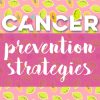In honor of National Cancer Prevention Month, we’ve compiled some preventative measures you can take to avoid the dreaded disease.
Tangible ways to use your diet as a cancer-fighting weapon:
• Limit salt and sodium intake when possible.
• Increase consumption of non-starchy vegetables such as broccoli, spinach, and beans (all types).
• Limit animal proteins, especially red meat.
• Increase intake of plant-based proteins, such as tofu and tempeh.
• Add more foods with antioxidants and high vitamin C levels, such as papayas, strawberries, kale, guava, oranges, lemons, limes, and peas.
• Choose whole grains over refined grains when possible. This means checking the ingredient list on the back of a product to make sure the first ingredient is a type of whole grain. For example, “whole grain,” “whole oats,” “whole grain cornmeal,” etc. Brands can sometimes mislead buyers with their front labels and claims, so the ingredient list is the most accurate place to confirm information about a food item.
• Up fiber intake, as fiber can help with healthy weight maintenance as well as reduce the risk of colon cancer.
Basic, no-brainer cancer prevention tips still worth repeating:
• Avoid tobacco. (This includes e-cigarettes, as well as secondhand smoke, and even thirdhand smoke, which results when residue from cigarette smoke lingers on surfaces exposed to it.)
• Even just thirty minutes a few times a week can prove beneficial, although daily physical activity is ideal.
• Skin protection through sunscreen, avoidance of tanning beds, and moderation of time spent outdoors. Ultimately, preventing skin cancer trumps the need for vitamin D!
• Get screened. This is especially important for anyone over the age of 40. Early detection isn’t technically a prevention method, but it does dramatically improve chances of survival and recovery, plus gives you peace of mind.
• Limit alcohol usage. No more than one or two drinks per day. Less is better. Zero is ideal.
Get a handle on other diseases that could lead to cancer:
• Get tested for Hepatitus C. The CDC recommends this especially for anyone born between 1945 through 1965. Undetected Hepatitus C can lead to serious liver damage over time, which can then progress into cancer.
• Get vaccinated against Human Papilloma Virus (HPV), as it can also develop into cancer.
• Practice hygienic intimate health, as studies show that people with sexually transmitted diseases have a higher risk for cancer, especially if the infection has been dormant and undetected in the body over time.
If you found an error, highlight it and press Shift + Enter or click here to inform us.



